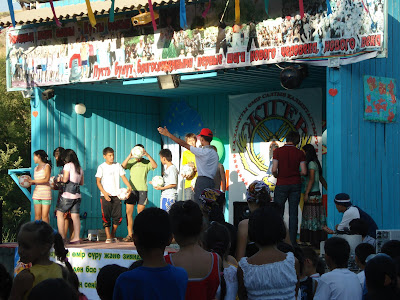Monday 20th July
Music and games with the children today. After three burst balloons I spent the next hour constantly picking children up and having them literally walk all over me. There are two disabled children at the hospital. I’m sure what their disabilities are but both have reduced speech and coordination. Life really has dealt them and their parents a double blow. It is difficult to work with them alongside the other kids but they are remarkably good at including them. After work Nina and I met with Anne-Marie to discuss our plans for a four day CAD/art therapy session with the children in August working with Britney from the peace corp. Though seems that none of us actually know anything about art therapy it will be a glorified version of what Nina and I do every day except paid for by the peace corp.
Tuesday 21st July
Awoke this morning to the sound of gun shots. At first I thought it was a car back firing but it kept happening and then we heard a dog cry out and realised what was happening. They were culling the strays. Gulnara asked what happened to stray dogs in the
Wednesday 22nd July
At work today we had the first child who really looked sick. He was really pale and balding, with his hands and face were covered in small scars and fresh legions layered with this green substance they appear to apply to the smallest of injuries. I was shocked to see what I guess I had been expected at the start but hadn’t seen. We made pasta jewellery. It turned into the usual supervised chaos. The parents often annoy me more than anything. They are no better about sharing, grabbing things and making a mess than the children. After work we watched the new Harry Potter film at the cinema, or rather ‘Garry Potter’ as he is known in Russian due to the absence of a ‘H’ sound in the alphabet. I was glad that I had read the book as I got very little of the dialogue but I enjoyed the general story, special effects, and pointing out deviations from the book.
Thursday 23rd July
Didn’t meet Nina until 10:45 for work today as she ad to pick up a cartoon form Aigera for the children. Cinderella did not manage to hold their attention for the whole time, didn’t help that it was dubbed over by just one very boring Russian voice, but they did seem to enjoy doing something different. After work I went looking for shoes but didn’t buy anything. I got put off by the pushy shop assistants and the disapproving looks they were giving my bazaar bought sandals. I’m going to treat myself to a few cheap pairs before I head home though. I think I can pull a few nice coloured pairs out of the rhinestoned masses. I ran into Grace and Kate in the Mega centre and we went for a coffee before I headed for the internet café. Still haven’t heard from teach first. I am going to ring them tomorrow to check that they have received my application. Back at home I brought up the subject of our GCD evaluation with Gulnara. After she roughly and begrudgingly translated a coupe of comments for me we wrote our evaluations separately.
Friday 24th July
Maybe the beer I shared with Grace in Mega has addled my brain but I think I am really starting to enjoy myself here. I made a decision on the bus home today to try and make the most of everyday here as I know I will regret it when I get home if I don’t. Mind you today was a good day. I rang teach first and learnt that I had passed the application stage and won’t have to have a telephone interview due to being abroad as they have places at an assessment centre in September.
FACTS
According to a UN report 1 in 5 victims of human trafficking is a child
The UN records 12 million people living in slavery. The actual number is estimated to be 200 million
Europol calculates that human trafficking makes $12 billion a year. The UN calculates it at $9 billion.
800, 000 people a year are forced into labour abroad each year (many more remain in their own countries. 50% of these are children.
80% of forced labourers are women. Half of these are under 18.
79% of all human trafficking involves sexual expolitation of women and children.
The UN convention on human trafficking was ratified on 21st March 1950 and came into force on 25th July 1951.
Each year the U.S. Department of State complies the Trafficking in Persons Report. This report rates foreign governments’ efforts to eliminate severe forms of trafficking using a tier system. Countries in tier 1 governments fully comply with the Trafficking Victims Protection Act’s (TVPA) minimum standards. Whose in tier 2 do not fully comply with the TVPA’s minimum standards, but are making significant efforts to bring themselves into compliance with those standards. Countries in the tier 2 watch list do not fully comply with the TVPA’s minimum standards, but are making significant efforts to bring themselves into compliance with those standards AND:
a) The absolute number of victims of severe forms of trafficking is very significant or is significantly increasing; or
b) There is a failure to provide evidence of increasing efforts to combat severe forms of trafficking in persons from the previous year; or
c) The determination that a country is making significant efforts to bring themselves into compliance with minimum standards was based on commitments by the country to take additional future steps over the next year. Whose in tier 3 do not fully comply with the minimum standards and are not making significant efforts to do so. Our group guessed the tiers that the following countries would be in and were then given their true tier by Sarah and Olga. I’m afraid that I did not record our guesses except in the case of the
Australia - Tier 1
Kazakhstan - Tier 2
Pakistan - Tier 2
Russia - Tier 2 watch
Iran - Tier 3
South Africa - Tier 2 watch
Germany - Tier 1
Georgia - Tier 1
Ireland - Tier 2
Spain - Tier 1
Afghanistan - Tier 2
Hong Kong - Tier 1
Switzerland - Tier 1
Saudi Arabia - Tier 3
Turkey - Tier 2
Bangladesh - Tier 2
India - Tier 2 watch
For the full listing look here
Many of our team claimed to be able to identify an American bias (e.g.
Next we looked at three case studies beginning with that of Lila, a Romanian girl trafficking by an acquaintance to the
After this task Joe, a peace corp. volunteer working at Sana Sezim (a human rights organisation), came to speak with us. He told us that
After the GCD we went to Sarah and Dinara’s placement for ‘film club’. I stopped at a shop on the way to feed my Coca Cola addiction. I can take or leave it in the
Saturday 25th July
After a morning spent not doing very much at all (I was hoping to get some hand washing done but Nassima has yet to buy any more washing powder). I met Dina, Grace, Sarah, Kate, Beth and Ben at Mega at 3 for our trip to Bekjan Bazaar. I bought a pair of synthetic black gladiator style sandals for 1500 tenge, roughly £6 (I could have done a lot better for my money but it was burning a hole in my pocket), a skirt that could also be a strapless dress for 1000 T = £4, a fake amber necklace 300 T = £1.20, and a bracelet for 50 T = 20p. I also picked up some gifts for those back home. Grace bartered on everything she bought, but I can’t do it. It’s only ever a couple of hundred tenge, a pound or two. Though here that does mean an hour or so in the internet café or 2 and a bit Coca Colas… Maybe I should give it a go.
Inside Bekjan Bazaar
Sunday 26th July
ANOTHER CAD! Our sixth! This time we were running an anti-smoking “marathon” at a summer camp. The bus left Shymkent at 8:30am but we weren’t required until the afternoon so spent all morning in the camp sitting around providing a curious amusement and English practice for the children while not being told what was going on, with occasional expeditions for ice cream. This lack of information and organisation is an continual source of annoyance for the
Stage at the summer camp. Prizes are being handed out to the teams.





No comments:
Post a Comment